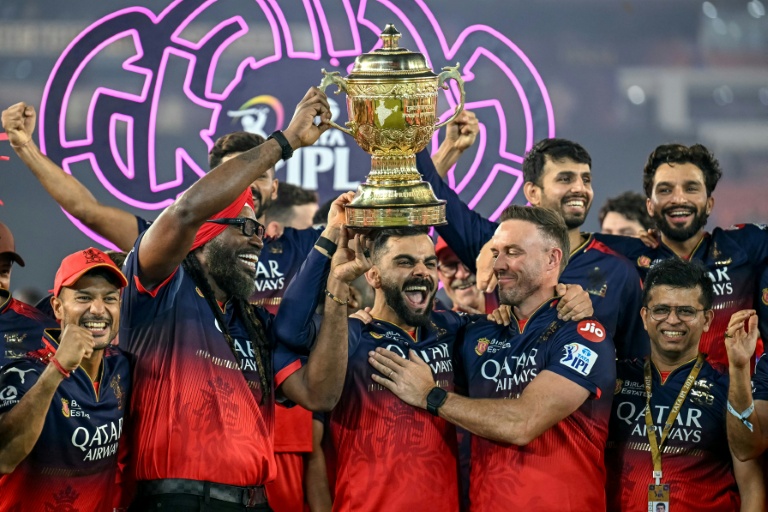Billion-Dollar RCB Sale: The Icarian Fall of Cricket Glory Amid Tragedy and Commercialism in India’s Sporting Landscape
The news surrounding the potential sale of Royal Challengers Bengaluru (RCB) is not just about a sports team; it’s an intersection of passion, tragedy, and financial speculation that encapsulates the dilemmas facing modern cricket in India. Owned by United Spirits Ltd, a subsidiary of Diageo, the franchise has been a source of pride for many fans, especially after clinching its first Indian Premier League (IPL) title in June. Yet, now, the prospect of selling this coveted asset for as much as $2 billion raises questions not only about the future of RCB but also the commercial realities of sports in today’s context.
United Spirits has initiated a strategic review of its investment in RCB, noting that the franchise, while valuable, is “non-core” to its business of alcoholic beverages. This statement might evoke cynicism among die-hard fans who equate sports teams with local pride, culture, and community. The decision is steeped in the realities of corporate strategy, where profits often overshadow passion. The CEO, Praveen Someshwar, emphasized the company’s commitment to reviewing its portfolio while keeping RCB’s “best interest” at the forefront. This raises an eyebrow: can financial metrics ever align with the emotional investments of fans?
RCB has long been a team that, despite its star-studded lineup, often fell short of winning the IPL, with several close calls and consistently high expectations from its followers. The long-awaited victory in 2023 reignited fervor among fans, making the proposed sale’s timing particularly sensitive. Following the euphoric win, RCB organized a trophy parade celebrating their achievement. However, tragedy soon marred the celebrations, with a devastating stampede claiming the lives of eleven fans and injuring over fifty. This incident not only highlighted the passionate, sometimes chaotic nature of fandom in India but also the sobering reality of the responsibilities that come with celebration.
Prime Minister Narendra Modi and RCB captain Virat Kohli expressed their heartbreak over the events, reflecting on the juxtaposition of triumph and tragedy. This moment crystallizes the complexities surrounding sports culture in India. The intensity of fandom often leads to overwhelming crowds, and when celebrations exceed expectations, dire consequences can ensue. The impact of this incident on RCB’s brand and financial prospects is yet to be fully realized, but it undeniably adds a poignant layer to the conversation about the franchise’s future.
The valuation of RCB at $2 billion also invites deeper reflection on the commodification of sports. In the contemporary landscape, franchises have become lucrative assets, drawing in investors not just for their cultural significance but primarily for their financial potential. The IPL itself, since its inception in 2008, has grown exponentially, with franchises becoming symbols of not just sporting excellence but also commercial viability. RCB’s case illustrates this dynamic well; its ownership is now evaluating options that align more closely with fiscal goals rather than community or regional commitments.
The potential sale of RCB raises crucial questions about the future of sports teams in India, where corporate interests are often at odds with traditional values. The IPL’s success has prompted a wave of new franchises, but it has also transformed how fans and stakeholders view these teams – as units of commerce rather than mere representations of local or national pride. In this light, the ongoing review by United Spirits highlights a broader trend where financial considerations dictate the fate of what was once seen as a communal endeavor.
As the review process unfolds and is slated for completion in March next year, it will be essential to observe how stakeholders, fans, and investors react to the shifting landscape. The IPL, an event that captures the heart of millions, may soon face a reckoning regarding the balance between commercial success and the emotional ties that bind its followers. For RCB, the road ahead is fraught with uncertainty, balancing its newfound glory with the weighty legacy of its past and the shadows of recent tragedies. The interplay of celebration and sorrow, profit and passion, will shape not just RCB’s future but the very fabric of cricketing culture in India, sparking discussions that transcend the boundaries of sport into the realms of ethics and identity.

The owner of India Premier League cricket champions Royal Challengers Bengaluru is considering selling the team, which could be worth "as much as $2 billion".
United Spirits Ltd, the Indian arm of global drinks giant Diageo, told the Mumbai Stock Exchange that it had begun a "strategic review of the investment" in Royal Challengers Bengaluru (RCB).
Praveen Someshwar, United Spirits CEO, said it "has been a valuable and strategic asset" but that it was "non-core to our alcobev business" in a letter dated Wednesday.
"This step reinforces USL’s and Diageo’s commitment to continue reviewing its India enterprise portfolio," he added, while keeping RCB’s "best interest in mind".
The review, expected to conclude in March next year, is of Royal Challengers Sports Pvt, the owner of both the men’s and women’s teams.
RCB lifted the Indian Premier League title in June for the first time in the money-spinning annual men’s T20 cricket tournament which was founded in 2008.
Bloomberg News reported soon after that the owners were "weighing possibilities including a sale of part or all of the club and may seek a valuation of as much as $2 billion".
A day after the final triumph in Ahmedabad, disaster struck RCB’s homecoming trophy parade when 11 fans were crushed to death and more than 50 others injured in a stampede outside the Chinnaswamy stadium in Bengaluru.
Hundreds of thousands had gathered on the streets of the city to welcome home their hero Virat Kohli and his victorious teammates.
Prime Minister Narendra Modi called it "absolutely heartrending" and Kohli said he was "at a loss for words" after the tragedy.
pjm/dh
